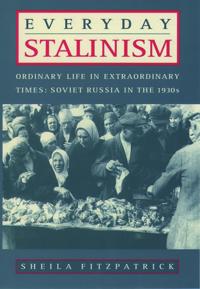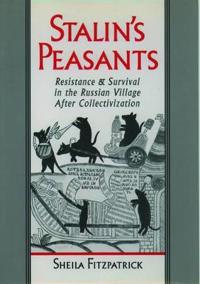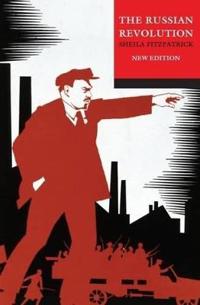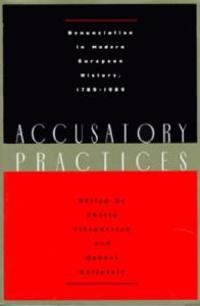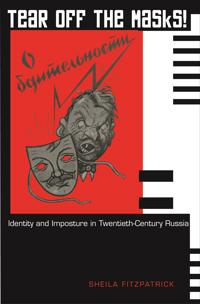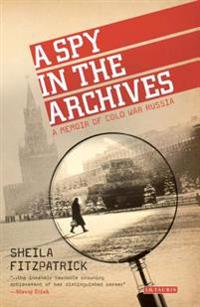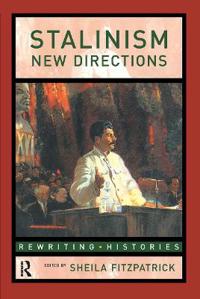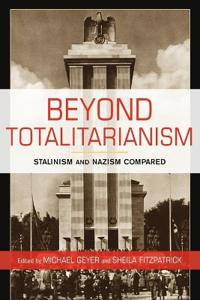Everyday Stalinism (Pocket)
avSheila Fitzpatrick
ISBN: 9780195050011 - UTGIVEN: 200005Here is a pioneeering account of everyday life under Stalin, written by one of our foremost authorities on modern Russain history. Focusing on urban areas in the 1930's, Sheila Fitzpatrick shows that with the adoption of collectivisation and the first Five Year Plan, everyday life was utterly transf[...]
Stalin's Peasants (Häftad)
avSheila Fitzpatrick
ISBN: 9780195104592 - UTGIVEN: 199612Drawing on newly-opened Soviet archives, especially the letters of complaint and petition with which peasants deluged the Soviet authorities in the 1930s, Stalin's Peasants analyses peasants' strategies of resistance and survival in the new world of the collectivized village. Stalin's Peasants is a [...]
The Russian Revolution (Häftad)
avSheila Fitzpatrick
ISBN: 9780199237678 - UTGIVEN: 200802The Russian Revolution had a decisive impact on the history of the twentieth century. In the years following the collapse of the Soviet regime and the opening of its archives, it has become possible to step back and see the full picture. This fully updated new edition of Sheila Fitzpatrick's classic[...]
Accusatory Practices (Häftad)
avSheila Fitzpatrick, Robert Gellately
ISBN: 9780226252742 - UTGIVEN: 1997-08The opening of the Stasi archives in 1989 revealed the existence of denunciation and informing in police states, but such practices have long been known. This is an exploration of denunciation and informing in Europe in the two centuries between the French Revolution and the fall of the Berlin Wall.[...]
Tear Off the Masks! (Häftad)
avSheila Fitzpatrick
ISBN: 9780691122458 - UTGIVEN: 200507When revolutions happen, they change the rules of everyday life - both the codified rules concerning the social and legal classifications of citizens and the unwritten rules about how individuals present themselves to others. This occurred in Russia after the Bolshevik Revolution of 1917, which laid[...]
Study Guide for Introduction to Brain and Behavior (Häftad)
avSheila Fitzpatrick
ISBN: 9781464109904 - UTGIVEN: 201302This detailed study guide helps students to understand and retain the material in An Introduction to Brain and Behavior, 4th edition, by Kolb and Whishaw. Each chapter includes practice tests and exercises, key concept reviews, guided study questions and section reviews.[...]
A Spy in the Archives (Inbunden)
avSheila Fitzpatrick
ISBN: 9781780767802 - UTGIVEN: 2013-12Moscow in the 1960s was the other side of the Iron Curtain: mysterious, exotic, even dangerous. In 1966 the historian Sheila Fitzpatrick travelled to Moscow to research in the Soviet archives. This was the era of Brezhnev, of a possible 'thaw' in the Cold War, when the Soviets couldn't decide eithe[...]
Stalinism (Pocket)
avSheila (EDT) Fitzpatrick
ISBN: 9780415152341 - UTGIVEN: 1999-12Stalinism is a provocative addition to the current debates related to the history of the Stalinist period of the Soviet Union. Sheila Fitzpatrick has collected together the newest and the most exciting work by young Russian, American and European scholars, as well as some of the seminal articles th[...]
Beyond Totalitarianism (Pocket)
avMichael (EDT) Geyer, Sheila (EDT) Fitzpatrick, Michael (EDT) Geyer
ISBN: 9780521723978 - UTGIVEN: 2008-12In essays written jointly by specialists on Soviet and German history, the contributors to this book rethink and rework the nature of Stalinism and Nazism and establish a new methodology for viewing their histories that goes well beyond the now-outdated twentieth-century models of totalitarianism, i[...]

